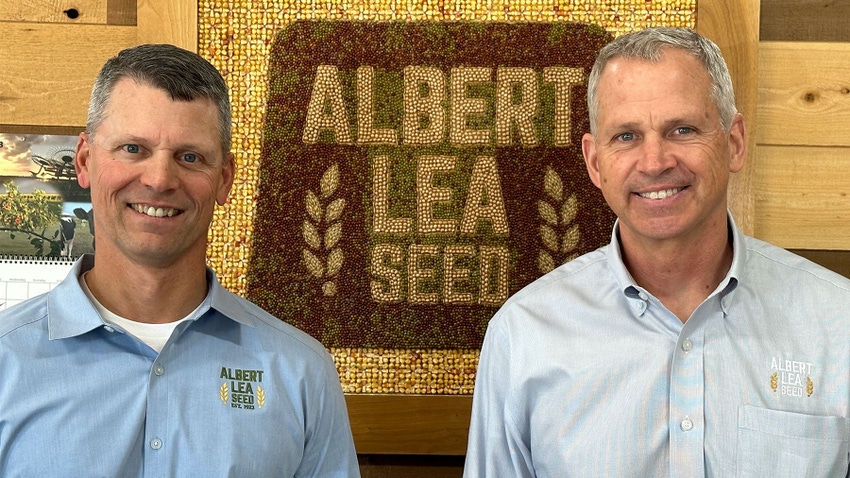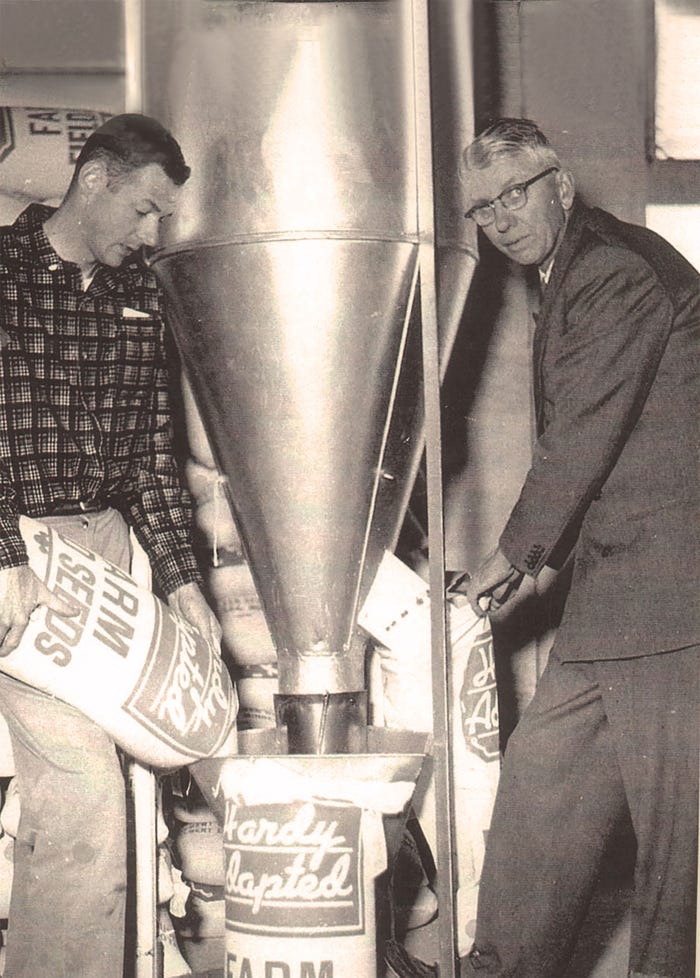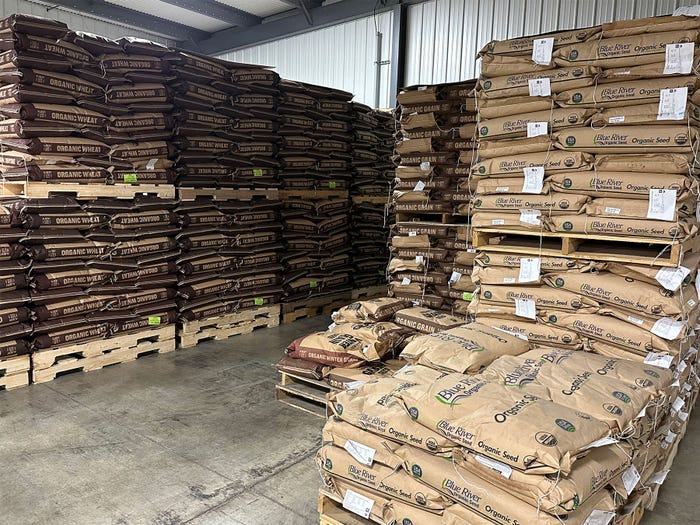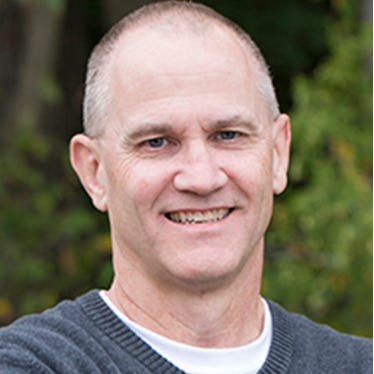
Mac Ehrhardt tells the story of how his late-father, George, would get mad at him when the younger Ehrhardt would tell a customer that Albert Lea Seed didn’t carry what the customer needed and referred them to another business.
Though that may not seem like a wise business practice, the younger Ehrhardt feels that helping the customer, regardless how unorthodox it may appear, works out in the long run.
“You never want to turn away business; but my belief is that if you treat people like you want to be treated, and you give them good information, they’re going to come back,” Mac says. “They may not buy seed from you every year, but that’s OK. But if you give them good advice, and you help them, they’re going to keep coming back. Then you have a long-term relationship that’s not necessarily just transactional.”

SEEDS OF THE FUTURE: George Ehrhardt (left) and Lou Ehrhardt mix seed at Albert Lea Seed circa 1950. (Courtesy of Albert Lea Seed)
Apparently, that customer-first approach has worked as this year Albert Lea Seed celebrates 100 years of operation, as the name implies, in Albert Lea in Freeborn County, Minn.
Mac’s grandfather Lou Ehrhardt started Albert Lea Seed in 1923, after buying the retail side of Wedge Seeds from his brother-in-law Ralph Wedge. In the beginning, Lou offered Grimm alfalfa, Hubam sweetclover, Danish Sludstrup mangel beets, Marquis wheat, sudangrass, flax, peas, oats, Dwarf Essex rapeseed, MN13 open-pollinated field corn, and at the time a relatively new forage crop called Habaro soybeans.
As growers’ desire for crop diversity continued to get larger, so has the lineup from Albert Lea Seed — which surpasses 100 crop species today.
'Just who we are'
“Diversity has been the hallmark of our business from the beginning,” Mac says, “and by diversity, I mean diversity of seed. A lot of seed companies that you see advertised they only sell corn and soybeans or some of them literally only sell corn. And if you look in our catalogs, we have hundreds of species and varieties. That’s not clever — it’s just who we are. Because diversity is a hallmark of regenerative agriculture, right?”
Lou’s son George — father of current owners Mac, Tom and Margaret — joined the operation around 1947. Tom came into the operation in 1981, and Mac followed 10 years later.
George had sold public variety corn hybrids, but in the 1970s he started selling what became Albert Lea Seed’s stalwart Viking brand, which today would be called a non-genetically modified organism corn. “We didn’t call it non-GMO corn, it was just hybrid seed corn,” Mac says.
Viking’s introduction predated the GMO movement, and Albert Lea Seed did offer seed with those various traits to compete in that environment.
“In the 2000s we had all the BT and Roundup traits in the Viking brand,” he says. In 1998, Albert Lea Seed started offering organic seeds, with organic corn added to the catalog in 2004. “We used this brand [Viking] to sell organic corn. So, we were selling conventional, non-GMO and we were selling traited corn, Bt corn, Roundup corn; and we were selling organic corn, which was always kind of difficult. I called it straddling a barbed wire fence because at that point, organic farmers and conventional farmers didn’t like each other very much. Now there’s a lot less animosity because I think the conventional farmers view it as a legitimate niche market. Now, there are some large conventional farmers that have 1,200 to 1,800 acres that they farm organically as a diversity play on their farm.”
The decision was made to quit straddling that proverbial barbed wire fence, as Albert Lea Seed got out of the traited seed market and now only offers non-GMO and organic seed.
Sowing tomorrow’s success
“Sowing tomorrow’s success” is a prominently displayed slogan on the company’s 100-year anniversary logo, and Mac Ehrhardt and the team are positioning themselves for a run at another 100.
In 2022, Albert Lea Seed acquired Blue River Organic Seed of Ames, Iowa, and in doing so became the largest supplier of organic farm seed in the United States. Starting this year, organic corn, soybeans and alfalfa seed coming out of Albert Lea Seed will carry the Blue River brand. Albert Lea Seed will also provide a variety of organic small grains, cover crops, forages and other farm seeds. The Viking brand will live on as the company’s conventional non-GMO corn, soybean and alfalfa product line.
Over the past century, Albert Lea Seed has carved a niche in the seed industry, and Mac sees the company remaining as a player.

IT’S IN THE BAG: The warehouse at Albert Lea Seed is stocked with what farmers need with a variety of organic and non-GMO seed varieties. (Kevin Schulz)
“That’s going to be our core business, providing seed and information to farmers that want to farm organically or using regenerative agriculture practices,” he says. “That could mean a cover crop, that could mean a winter grain for conventional farmers. … That’s really where we’re going to try to focus our business because it is a niche — but it’s a niche that’s plenty big for us, and one that we’re pretty comfortable in because we’ve been doing it for a long time.”
Built for the future
In September, Albert Lea Seed became half-owners of a corn-breeding program. “We’ve never been in a position of actually breeding and developing corn hybrids; we’ve always just been a licensor,” Mac says. “Moving forward, we are going to be in an ownership position of some germplasm that we’re using to breed corn hybrids specifically for the organic and non-GMO market, and that is a big change for us.”
There will also be new leadership and ownership in the company. Giving up his title as president, Mac is now chairman of the board. Brett Bell came on board in late August as president and CEO. Three current employees — Matt Helgeson, Ben Hinueber and Elia Romano — and former employee Bob Atwell have taken part ownership of the company.
Though Mac claims he isn’t “romantic” about keeping the company in the family, Hinueber is the son of Mac’s first cousin and Romano is Mac’s brother-in-law.
Bell brings 27 years of experience in ag business, including leadership roles in seed sales and agronomy — most recently as executive vice president at Anuvia Plant Nutrients. He doesn’t see a need to change course: just keep it moving forward.
“Why I’m here is really two-fold,” Bell says, “to continue to do the good work that the Ehrhardt family has done up to this point. But also, to help the organization optimize the business relative to the acquisition” of Blue River.
The Blue River acquisition has helped Albert Lea Seed’s business grow by 25%, growth that sets the company up for a great start to its second century.
About the Author(s)
You May Also Like






